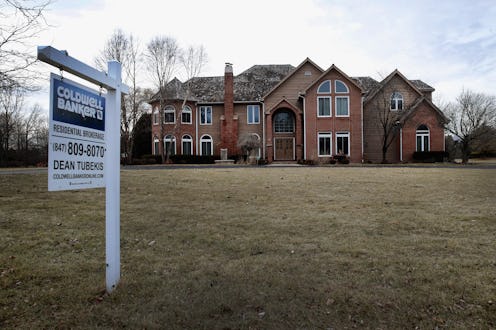
I’ll admit that I don’t tend to pay much attention to the housing marketing; mostly I know that when it’s bad, rents are cheap, and when it’s good, rents are expensive. But if you’re more invested in it and actually, y’know, wondering, “Is it better to rent or buy?”, the New York Times has exactly what you need. This handy-dandy calculator in the paper's “Upshot” section will work out what’s best for you — as long as you have the data to plug into it in the first place.
The calculator is an interactive pegged to an article by Neil Irwin examining how the math involved in deciding to rent or buy has changed in recent years. The housing market tanked with the economy; it’s also improved with the economy, though, so the numbers you needed to consider a few years ago are different than they are now. That’s where the calculator comes in: It both deals with the most common expenses of owning and renting — filed under “initial costs,” “recurring costs,” and “net proceeds” — as well as calculates something called “opportunity cost.” The Times describes opportunity cost via an example, e.g., “the return you could have earned by investing your money instead of spending it on a down payment.” Here’s how it works:
First, define your terms. For buying, initial costs are what you incur when you close on the home you’re purchasing (down payment, etc.); recurring costs are the ones you’ll have to shell out monthly or yearly, like mortgage payments, maintenance costs, and property taxes; opportunity costs track both initial and recurring costs, painting a picture of what you might have made if you’d invested your down payment instead of buying a home; and net proceeds encompass the amount of money you get from the sale of your home minus the closing costs. Meanwhile, for renting, initial costs include your security deposit (and broker’s fee, if you used a broker); recurring costs include your monthly rent and renter’s insurance; opportunity costs are calculated based on your initial and recurring costs; and net proceeds include the return of your security deposit once your lease has ended.
I’ll be honest: Most of the numbers the calculator crunches don’t mean much to me. I’ve never purchased a house; furthermore, I’m anticipating being somewhat migratory for at least the next few years, so I probably won’t be making plans to buy one anytime soon. As such, I’ve never made it a point to learn exactly what one needs to consider when purchasing a house. Between the two of us, though, my SO and I are working toward financial independence — and once we’ve achieved that (we’re on track to do it within the next ten years or so), we’ll likely put down roots somewhere permanently. That’s when we’ll start thinking about buying instead of renting.
But if you’re in the process of seriously considering buying a home you’ll probably have access to the numbers you need for the calculator to work its magic. These numbers include the cost of the home or homes you’re looking at; your mortgage rate; how long you plan to stay there; what you estimate your maintenance costs will be; and so on. Once you’ve plugged all those numbers in, the calculator will tell you in no uncertain terms whether it’s better to rent or to buy:
As well as a breakdown as to why that’s the case:
Neat-o, right?
Head on over to the New York Times to play around with it. Just, y’know … maybe don’t buy a house that’s perched on the edge of a cliff by a lake. We all know how that ends.
Images: Giphy (2); New York Times (2)